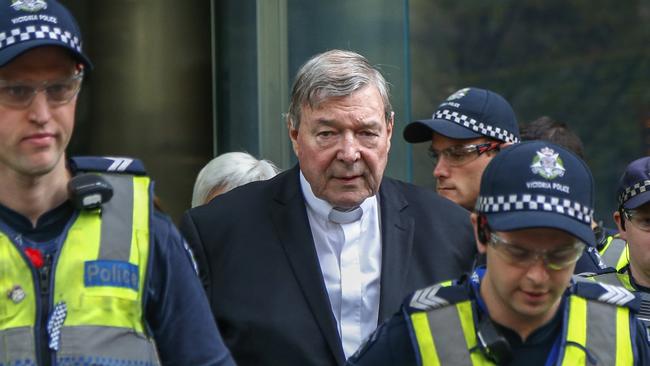High drama and even higher stakes: it’s the moment of truth for George Pell
It is a measure of George Pell’s lot that in prison he finds himself in notionally better surrounds but not necessarily better company.

The cardinal, still Australia’s most senior Catholic, will monitor next week’s High Court developments while in isolation in his relatively new home at Victoria’s maximum-security Barwon Prison, near Geelong.
Barwon is a hole that swallowed gangland murderer Carl Williams but it’s not quite as deep as Pell’s former holding cell in the centre of Melbourne.
Pell, 78, now has more room to move, with a more modern but still austere toilet, shower and general living facilities. He is served shoddy food and his main human contact is with the prison guards who bring him his medication for twin heart conditions.
It remains a life of deprivation.
Given his convictions, most people will be happy with Pell’s plight. For others who have followed the facts of the case closely, including the brightest minds in the law, next week’s High Court appeal will be a significant moment in Australian legal history.
There are deep divisions about whether Pell should even be in jail.
“If you look at all of the case law about unreasonable verdicts, it’s (the Pell convictions) right on the borderline of what’s reasonable and what isn’t,’’ Sydney University academic Andrew Dyer told Inquirer.
Dyer, who has co-authored a paper on the Pell case with the university’s Professor David Hamer, is not predicting in any way how the High Court will act. Nor is anyone else with any certainty.
But the paper, published in the Sydney Law Review, makes clear what many independent voices suspect: Pell’s convictions may be flawed.
Dyer and Hamer write that it appears open to the High Court to overturn the Pell verdicts on the basis of the cumulative effect of the evidence, but they doubt the court will make this finding.
They express concern about the impact that rejection of the Pell decision would have on the standing of juries.
Dyer and Hamer’s views are not black and white. They also make clear that the law allows for convictions based largely or solely on the complainant’s evidence and a different tack would “undermine the prohibition against child sexual assault’’.
This is a tick to the prosecution’s heavy reliance on the surviving choirboy, whose evidence was central to the Pell convictions.
In the paper, however, Dyer and Hamer note that key aspects of the evidence regarding Pell pointed to no opportunity to offend against A, the surviving victim, and B, another choirboy who died of a drug overdose.
“Once we also consider the inconsistencies in A’s account (however understandable), the unlikelihood that Pell would take such risks and B’s and Pell’s denials, it becomes apparent that a reasonable jury might not have convicted,’’ they write.
“Indeed, the case seems close to the borderline between one where the jury was entitled to return a guilty verdict, and one where it should have had a doubt.’’
On Wednesday, five or seven members of the High Court will gather in Canberra to decide Pell’s fate. Dyer thinks there will be seven but we probably won’t know until Tuesday afternoon.
The High Court will determine whether the Victorian Court of Appeal erred when it decided, 2:1 last year, that the County Court jury was within its rights to convict Pell of five sexual assault charges that occurred in the priests’ sacristy at Melbourne’s St Patrick’s Cathedral in 1996 and in a corridor in 1997.
Or whether there should have been a reasonable doubt.
Central to deliberations is whether belief in the complainant, now a family man in early middle age, could be used as a basis for eliminating doubt raised by other witnesses, several of whom were highly credible.
Pell’s submissions asked: “Was it open to the jury to find the offending proven beyond reasonable doubt?’’
As one well-informed observer noted this week, of all the charges that were filed against Pell, the cathedral claims were among the most difficult and even unlikely to have progressed to any court.
Those with deep understanding of the cathedral, Catholic rituals and Pell’s practices are incredulous that the archbishop could ever have been left alone for the five or six minutes upon which he was convicted of forced oral sex and other abuses.
It was not uncommon in that period for literally hundreds of people to gather after Solemn Mass, the numbers bolstered by busloads of Taiwanese tourists who swarmed into the cathedral.
Justice Mark Weinberg, the former Commonwealth Director of Public Prosecutions, was the dissenting voice at the Court of Appeal, arguing that aspects of A’s evidence lacked the necessary weight. But on A’s side were Justice Anne Ferguson and Justice Chris Maxwell, as were the County Court jury, Victoria Police and the prosecution.
Jeremy Gans, a professor of law at Melbourne University, said it would be most unlikely if any decision were to be made next week, with the court sitting on Wednesday and possibly Thursday.
There are four options for how the court hearings may unfold.
The court could decide not to hear the appeal and end Pell’s chances of being freed early. Special leave could be granted to hear the appeal and the appeal is rejected. And special leave could be granted and the appeal is allowed.
The fourth option is that special leave is granted and the case is sent back to the Court of Appeal with three different judges.
The latter would be awkward for all, but mostly Pell, who would have to wait months more to know whether freedom was a genuine prospect for him.
One technicality is over whether the Court of Appeal appropriately used video evidence to come to its conclusion. Gans believes the only way Pell would walk next week would be if the court ruled on the spot. Even so: “I still reckon they’d wait.’’
Mirko Bagaric, dean of law at Swinburne University, notes the difficulty in predictions but says the High Court may opt for a narrow, contained judgment.
“The court ultimately will have to grapple with the issue about whether or not the jury verdict was reasonable,’’ he said. “It’s impossible to anticipate.’’
The prosecution’s submissions are firm in their view that the jury decision should not be overturned. The first County Court jury failed to reach a verdict; the second convicted. In a submission lodged by Victorian Director of Public Prosecutions Kerri Judd, the prosecution argues: “It (the jury) is best placed to decide matters of credibility and reliability. The jury has the benefit of being able to deliberate as a group in private throughout the trial. And its decisions are subject to the discipline generated by the requirement of unanimity or a very high majority.’’
The prosecution also argues that Team Pell glosses over the quality of the evidence provided by A, who correctly identified the location of the first offending and correctly described the layout of the priests’ sacristy.
It calls into question the so-called “alibi’’ evidence provided by key witnesses. But overshadowing this is the fact that Weinberg, the legal expert on the Court of Appeal, effectively raised the spectre in his dissenting judgment of an innocent man having been wrongly convicted. Weinberg observed: “These convictions were based upon the jury’s assessment of the complainant as a witness and nothing more.’’
Further, he was damning of the conviction of Pell on the final charge, which was that in 1997 the then archbishop assaulted A in front of others, grabbing him on the testicles in front of dozens.
“I would have thought any prosecutor would be wary of bringing a charge of this gravity against anyone based upon the implausible notion that a sexual assault of this kind would take place in public and in the presence of numerous potential witnesses,’’ Weinberg ruled.
The final element of the High Court deliberations is expected to relate to the way the Court of Appeal assessed A’s evidence, which was videotaped.
The court, The Australian reported last month, was weighing the importance of viewing A’s testimony compared with reading the transcript.
A technical point is being considered by the High Court over what the Court of Appeal should have viewed by way of video evidence and whether, chiefly, the Court of Appeal should have strayed from the trial transcript.
Team Pell had argued that no matter how favourable the view was of A, it was not open to the jury to conclude the prosecution had eliminated all reasonable doubt. This is in the context of the combined effect of the unchallenged evidence of other witnesses.
While apparently a technical point, it could become significant if the High Court believes that the majority Court of Appeal judges went too far in their use of the video evidence.
Pell himself, meanwhile, will have no idea what is happening on Wednesday.
The proceedings will not be livestreamed outside the court and he will have to wait, probably until each night, when he may have the opportunity to telephone someone who was at the High Court for a briefing.
Maybe even his lead silk, Bret Walker, SC, depending on whether he is on the cardinal’s limited telephone list.
Regardless of the outcome, the assessment of Pell’s guilt or innocence will resonate for years.
His supporters and a fair slab of the legal community are questioning whether the jury and the majority on the Court of Appeal got it right.
Within sections of the Catholic Church there is a strong view that the maths don’t add up.
How could one of the busier parts of Melbourne on a Sunday morning be the site for such depraved acts? More broadly, if Pell is acquitted, it will provoke one of the fiercest debates in the history of Australian law and order, and religion.
The best hope is that the facts are allowed to tell the full story.
As we’ve been told repeatedly, it doesn’t matter what you might think of the man. But it matters if an innocent man has been jailed.
The Pell critics will get another chance to dance on his reputational grave after the High Court has finished.
That will come when the redacted sections of the sex abuse royal commission are finally released by the Morrison government.
Like so many pronouncements about Pell in recent years, they are unlikely to be kind.




It is a measure of George Pell’s lot that he finds himself in notionally better surrounds but not necessarily better company.